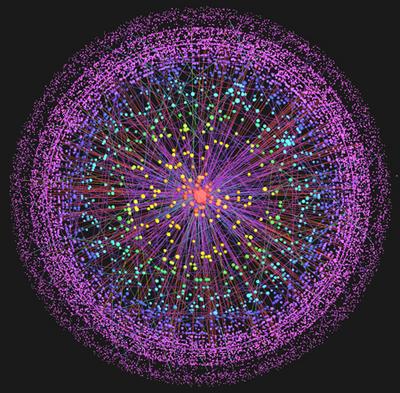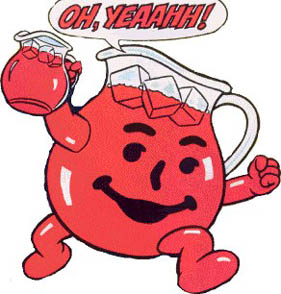
Pierre Far has a thoughtful post asking whether or not Social Media is the final frontier of marketing.
He concludes that if you could answer the question, then you might be the next Seth Godin. Well, not even Google can help me turn up the consensus on the subject. However, the Holy Grail of marketing is an active discussion. To be fair, Pierre’s path to staging the original question and exploring potential answers is interesting and insightful.
The history of marketing, as presented, is incomplete however. Instead, let’s focus on answering the question he proposed, as I believe that’s where we can be most productive.
The short answer is no. Social Media is not the final frontier of marketing and it’s premature and even a bit shortsighted to make this conclusion.
Pierre does stop short of making such a bold claim. But there are still a few points of contention. For example, “With the new powerful feedback mechanism implemented in social media, the loop is closed: the communication becomes two-way.”
This is assuming of course that the cycle of communication and closing the loop between customers back to companies was the Holy Grail of marketing. And, it implies, that the cycle of communication wasn’t two-way until now.
First, closing the loop between people and companies isn’t the Holy Grail nor is it the Final Frontier. Furthermore, companies and customers have shared a two-way street over the years, with the only difference between now and then, are the tools and popular psychology and philosophies behind their implementation.
Pierre then aligns Social Media and the Web with the ability to dictate company success or failure, “People have the internet, and anyone can write up his or her thoughts – good or bad – and get thousands of people to read them. If a product is bad, there will be enough people raising their concerns loudly enough that companies have no option but to react very quickly: a few bad reviews could kill a product launch.”
Yes, this is absolutely relevant, and in some cases true.
Could a few bad reviews kill a product?
Unfortunately not.
If so, markets would be rich with fantastic products supported by glowing reviews.
But, let’s be clear and not get too drunk on the Social Media Kool-Aid.

Pierre surmises, “Again, by no means is this new. There is no re-invention of marketing or public relations. That’s not the point. The point is that consumers now have a more potent aggregate power: someone with a problem can now reach others with the same problem faster, build a community around this sharffsed problem easily, and mobilize lots of people behind the common cause more efficiently. That’s what’s new: a significant leap in efficiency. This gives consumers a loud voice that companies have to listen to.”
Customers have always had a voice, drove peer-to-peer influence, and leveraged paths to talk directly to companies. They simply used the tools of time. And, the more savvy customers used traditional PR and the very mediums many companies employed to reach them in order to garner attention, public support, and solutions. Certain companies listened, others did not…and still don’t.
In 1994-5’ish with the popularization of the Web, we saw some of the earliest forms of online Social Media (user groups, enthusiasts sites, forums, bulleting boards, etc.) emerge. Although back then, we called it New Media and, it was around the same time I started talking about PR 2.0 and how the Web would change the entire landscape for marketing and PR.
If anything Social Media, as it exists today, has simply created a more efficient platform which amplified and organized people’s voices as well as democratized content, and in doing so, collectively built a foundation for a new level influence between companies, traditional media, influencers, and people in general.
Social Media doesn’t necessarily replace traditional marketing. Everything is concentric. Everything should work together.
Companies > Influencers > Customers
Companies > People
People > People
People > Companies
Quite simply, the way I define Social Media and Social Media marketing is as follows:
Social Media is any platform or network on the Web that facilitates conversations between people…P2P (people to people).

Whereas, Social Media Marketing is the use of social tools to discover, listen to, and engage customers in meaningful, two way conversations….again P2P.

Remember, there’s a difference between the cultures of the communities that populate Social Networks, the channels that define Social Media, and the tools and technologies people use to communicate.
What strings everything together is listening, understanding, respect, and trust. The rest is just technology.
So in no way is Social Media the final frontier. We’re human. We evolve. Along with it, so the tools and channels for influence.
For example, reaching niche markets, the “Long Tail of PR” as I call it, still proves elusive. Connecting local services to customers online has yet to be conquered. Leveraging “new media” to transform people into brand ambassadors without encroaching on blatant advertising or infringing on personal privacy is only experimental now. Facebook had the right idea, for example, but poor execution.
These are all areas that could also be considered the final frontiers of marketing, but they are simply, new opportunities for engagement.
Customer behavior will evolve. And, along with it, new challenges will emerge and present new frontiers for marketing to conquer. Marketing, as always, will be forced to adapt.
Social Media is only the latest catalyst to humanize marketing and shed the traditional approach of positioning faceless companies to speak in messages at nameless audiences while plugging their ears and covering their eyes.
Connect with me on Twitter, Jaiku, Pownce, Plaxo, LinkedIn, or Facebook
Logo Credit: People to People





Thanks Brian! The big difference between social media marketing and more traditional WOM/community marketing is the tools used, not the intent & impact. Although the tools may enable more scalability & reach.
Just as email marketing surpasses direct mail in scalability & reach while being similar in intent & impact.
It will be most interesting to see where this all ends up. With the Internet still akin to a ship in rough seas, it will most likely take time for things to calm and settle.
Thought provoking and well stated post.
Brian,
Great article.Hadn’t thought of it before but I agree that Social Media is not the final frontier. We’re human. We evolve. And along with it, so the tools and channels for influence.
Cheers,
John Bergdoll
Search & Discovery. Social. Mobile. These trends are merely forcing the re-invention of ‘promotion’ in the marketing mix.
In my view the holy grail contains a reinvention of all four Ps:
PRODUCT: Create products people want, through approaches such as human-centred design, co-creation and customisation.
PRICE: Dynamically adapt prices based on factors such as customer loyalty, location, time.
PLACE: Put products in the right places at the right times, from rapid distribution (same-day delivery, drones, 3D-printing), to presenting them across multiple channels; web, mobile, retail show-rooming, etc.
PROMOTION: Brands must sit with customers, not sell to them.
Yep. Plus adding a P for Purpose, Promise, and People